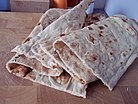Khubz mulawah
Appearance
 | |
| Alternative names | Mulawah, Khobz Mulawah |
|---|---|
| Type | Bread |
| Place of origin | Yemen, Israel Somalia[1][2] |
| Main ingredients | Puff pastry, Nigella sativa, Ghee or oil |
Khubz muluwah, Muluwah (Template:Lang-ar, Template:Lang-so), is a Yemenite Jewish and Somali flatbread that is baked in a traditional tannur in Yemeni cuisine.[3][4][5][6][7] A similar bread, malawach, has been brought to Israel by Yemenite Jews.[8][9].[10]
Khubz muluwah is often eaten for breakfast with ghee and honey on weekends.
Etymology
Both Muluwah and Lahoh terms come from the Arabic root (l-w-ḥ) which means the thing that is flat.
See also
References
- ^ Shaya, Alon (March 13, 2018). "Shaya: An Odyssey of Food, My Journey Back to Israel: A Cookbook". Knopf Doubleday Publishing Group – via Google Books.
- ^ Brown, Arthur S.; Holmes, Barbara (March 5, 1993). "Vegetarian dining in NYC: and not just the places the yuppies like". Callaloo Press – via Google Books.
- ^ "Food trails: the rich history of Yemeni cuisine". The National. Retrieved 2020-01-05.
- ^ "This tiny African nation sees refugees as an opportunity - not a burden". International Business Times UK. 2016-10-13. Retrieved 2020-01-05.
- ^ "Yemeni Malawah Bread". Sheba Yemeni Food.
- ^ Tok, Teddy (November 20, 2019). "Caps-Asian Every Night: Eat Better. Feel Alive". David Tok Llp – via Google Books.
- ^ "خبز الملوح اليمني بالفرن| مطبخ سيدتي". kitchen.sayidaty.net (in Arabic). Retrieved 2020-01-04.
- ^ Eyewitness, D. K. (October 1, 2014). "DK Eyewitness Top 10 Israel including Sinai and Petra". Dorling Kindersley Limited – via Google Books.
- ^ Grishaver, Joel Lurie (October 1, 1998). "Being Torah Student Commentary, 2". Torah Aura Productions – via Google Books.
- ^ Oatman, Maddie. "The simple, soulful dish these Somali refugees brought to America". Mother Jones. Retrieved 2020-01-05.

